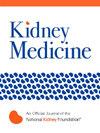Assessing Caregiver Burden in Kidney Failure: A Systematic Review of Measurement Properties of Instruments
IF 3.4
Q1 UROLOGY & NEPHROLOGY
引用次数: 0
Abstract
Caregiver burden in end-stage kidney disease requires assessment using validated instruments. This systematic review evaluated measurement properties of caregiver burden instruments in end-stage kidney disease using Consensus-Based Standards for the Selection of Health Measurement Instruments methodology. We searched 8 databases (PubMed, CINAHL, Embase, Web of Science, MEDLINE, Cochrane Library, Scopus, and PsycINFO) for studies evaluating measurement properties of caregiver burden instruments in caregivers of patients with kidney failure. The Consensus-Based Standards for the Selection of Health Measurement Instruments Risk of Bias checklist assessed methodological quality, and Grading of Recommendations Assessment, Development and Evaluation approach evaluated evidence quality. Twenty-four studies evaluating 21 distinct caregiver burden instruments were included. The Zarit Burden Interview, Caregiver Burden Scale, and Beck Depression Inventory were most frequently evaluated. Only a few instruments had high-quality evidence of sufficient content validity, internal consistency, test-retest reliability, and construct validity. Cross-cultural validity was assessed for only 9 instruments, with most rated as indeterminate owing to methodological limitations. No studies evaluated responsiveness to change over time. Quality of evidence was low to very low for most measurement properties, highlighting significant gaps in validation research. The Zarit Burden Interview, Caregiver Burden Scale, and Beck Depression Inventory show promising validity and reliability but require further testing. Rigorously conducted validation studies, involvement of caregivers of patients with kidney failure in content validation, and cross-cultural adaptations are priorities for optimizing burden assessment in this unique population.
评估肾衰竭的照顾者负担:仪器测量特性的系统回顾。
终末期肾病的照顾者负担需要使用有效的工具进行评估。本系统综述使用基于共识的健康测量工具选择标准,评估终末期肾病护理者负担工具的测量特性。我们检索了8个数据库(PubMed, CINAHL, Embase, Web of Science, MEDLINE, Cochrane Library, Scopus和PsycINFO),以评估肾衰竭患者护理者负担仪器的测量特性。基于共识的健康测量工具选择标准偏倚风险检查表评估了方法学质量,建议分级评估、发展和评价方法评估了证据质量。包括24项研究,评估21种不同的照顾者负担工具。最常评估的是Zarit负担访谈、照顾者负担量表和Beck抑郁量表。只有少数工具具有足够的内容效度、内部一致性、重测信度和结构效度的高质量证据。仅对9种工具进行了跨文化有效性评估,由于方法限制,大多数工具被评为不确定。没有研究评估随时间变化的反应性。大多数测量属性的证据质量低到非常低,这突出了验证研究中的重大差距。Zarit负担访谈、照顾者负担量表和Beck抑郁量表显示了良好的效度和信度,但需要进一步的测试。严格进行验证研究,让肾衰竭患者的护理人员参与内容验证,以及跨文化适应是优化这一独特人群负担评估的优先事项。
本文章由计算机程序翻译,如有差异,请以英文原文为准。
求助全文
约1分钟内获得全文
求助全文

 求助内容:
求助内容: 应助结果提醒方式:
应助结果提醒方式:


